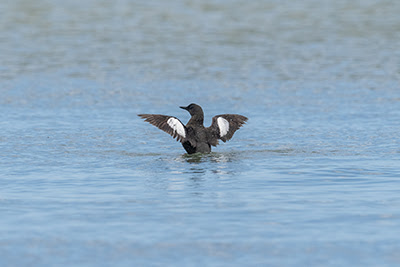Hello, is that Phil? That's how my surreal day started around 11.30 yesterday morning. The caller was Simon Hugheston-Jones from the RSPB office in Bangor. He'd been given my number by Colin Wells, site manager for the RSPB at the nearby Dee Estuary complex.
A member of staff from Lloyd Jones Engineering Merchants at Sandycroft had rung to say there were two Kingfishers trapped in their industrial unit above a mezzanine floor and even though the roller door had been left open the birds were trying to get out through non-opening skylights in the roof. This was about 15 minutes from my office and knowing I was a ringer Colin had suggested to Simon I may be able to help.
Firstly I rang Ken at Lloyd Jones to make sure the birds were still there and they were actually Kingfishers - they were and were!!!!. Next, knowing the sensitivity of the situation and potential licensing issues, I rang Allison Kew at the BTO. Allison rang me back after checking the situation and gave me the go ahead to catch the birds and ring them if I thought they were healthy enough.
Having to virtually pass the site on the way to a meeting the other side of Chester I arranged to call in to assess the situation and check if putting a mist net up inside the building on the mezzanine was feasible. It was pretty surreal seeing to Kingfishers buzzing around calling and bobbing up and down on industrial shelving units! The birds had created a lot of interest and visitors to the retail counter were being led upstairs to see them. I tired using the iPhone set to play Kingfisher call to attract them down from the mezzanine where they' d hopefully see the open roller door but they weren't having any of that so I arranged to go back later with a 30ft mist net.
Setting the net in what appeared to be an ideal place it soon became apparent the birds had other ideas. Leaving me with a cup of tea the staff who'd all been watching with interest backed off and left me to quietly watch the birds movements. After an hour of fruitless waiting the birds were showing a complete lack of interest to the recorded calls being played through a small speaker so I decided to move the net.
Within 10 minutes one bird had been caught and its calls attracted the second bird. Both were quickly removed from the net and taken outside where they were assessed to be fit and healthy so were ringed and processed before releasing in front of a group of staff and the local postie who'd seen them in the building earlier.
The birds were both young born this year and were sexed as a male and female. A small stream runs right alongside the industrial unit and my feeling is this was a territorial dispute with one bird encroaching on anothers territory. The resulting chase ended up with them both flying through an open roller door!
Its at least 5 years since I ringed a Kingfisher! They take a special ring that has to be overlapped precisely to fit the birds tarsus. They're not a usual ring used in everyday ringing activities at my sites but luckily I'd bought 10 just in case a Kingfisher ever turned up in the garden as I've seen them once on our local pond!
A great story and a good public relations exercise. Mind you I don't think they were bothered with the water left out for them or the open tin of sardines!
After packing up my gear and chatting to the staff I was pleased to hear the birds calling as they whizzed up and down the stream as I returned to the Landrover. Hopefully they'll pay a bit more attention to where they're going next time they play chase through an industrial estate.
Many thanks to the local postman who was commandeered to take a few record shots with my phone just before the birds were released together. After seeing the birds earlier he turned up again later to check on progress and arrived just at the right time.
I've always had a soft spot for Kingfishers after moving to Suffolk as a kid in the 70's and finding a pair nesting on our local stream. I even wrote an article on them which was published in the now defunct YOC (Young Ornithologists Club) which was the junior section of the RSPB.
26 Sept 2014
Subscribe to:
Post Comments
(
Atom
)































































No comments :
Post a Comment